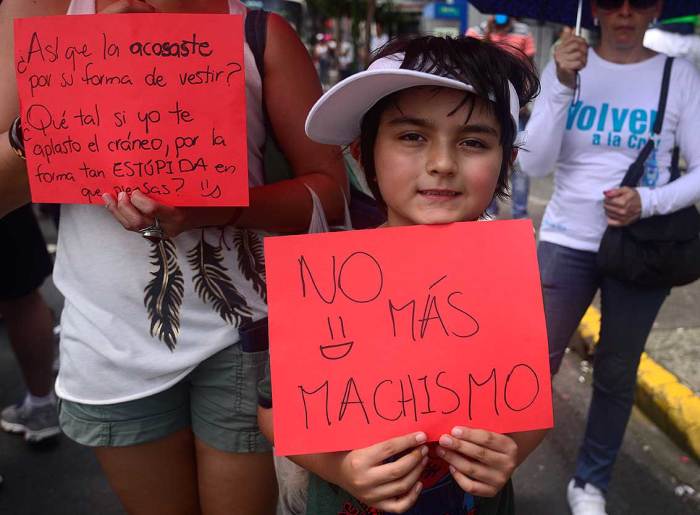
This has been a busy month in Costa Rica.
Last week there was a march against street harassment.
“More than 100 people wearing white and carrying signs marched in the Costa Rican capital San José on Sunday morning to protest against sexual harassment in public places, or street harassment. They also marched in solidarity with the family of Gerardo Cruz, a young man who was stabbed shortly after publicly shaming another man for lewd behavior in the street…
Marchers said they came out for several reasons, ranging from support for the Cruz family to making a stand against sexual harassment and machista culture.
“I came because I’m a mother and I want to support a better world for my daughter and show respect for all the women in the country,” said María Gutiérrez, a 33-year-old judicial branch worker who pushed a stroller with her baby.
Rebeca Pérez, a 33-year-old makeup artist, was there wearing white with her son, Aaron. “I’m here because I want to show my son that we [women] deserve respect, and to set a good example for him, not the negative ones we see every day.”
Pérez said the first time she got harassed in the street was in front of her home when she was 9 years old. A man approached her and started asking her questions about sexual development, she said.
“I hope there’s a change,” she said, carrying a sign that read, “If we teach our children, street harassment will end.”
This month, the women’s rights group Colectivo Acción Respeto Costa Rica and other organizations launched an initiative to draft and submit a bill for criminalizing catcalls and other forms of sexual harassment in public spaces.
“The groups announced their proposal during a press conference at the Legislative Assembly where lawmakers from the ruling Citizen Action Party (PAC), National Liberation Party (PLN) and Broad Front Party (FA) offered support to promote the adoption of the draft. Among its main goals the initiative asks for the inclusion of street harassment as an offense in the country’s Penal Code.
Alejandra Arburola Cabrera, a spokeswoman with the Colectivo, told The Tico Times that they started working on the initiative months ago, however the recent stabbing of Gerardo Cruz prompted them to speed up the discussion and include lawmakers and citizens.
Cruz was stabbed twice one day after he posted on his Facebook profile a video he shot of another man recording video with his cellphone up the skirt of a female pedestrian in downtown San José. Cruz has since undergone three surgeries and currently remains at Calderón Guardia hospital.
Arburola said Cruz’s case is a reflection of the reality that haunts women from the moment they leave their houses everyday. “We are seen as objects, with no rights and submitted to constant violence. This needs to stop as soon as possible,” she said.
Tuesday’s meeting also allowed the groups’ leaders to call on all citizens to participate in the drafting of the bill, following a number of priorities identified by the group in recent months.
Among them, they believe the bill should clearly define street harassment based on gender or sexual orientation as a criminal offense punishable with prison sentences…
This isn’t the first time Costa Rica considers penalizing street harassment. In 2005, then-Costa Rica legislator Gloria Valerín Rodríguez (Social Christian Unity Party) introduced a bill that would have added street harassment against women to Costa Rica’s penal code.
Valerín proposed a fine of 30 to 50 days minimum wage for perpetrators. The bill was unsuccessful.”
There is also a new social media campaign in Costa Rico to engage men in the issue. The Ombudsman’s office, the National Institute for Women and NGO “El acoso callejero no es cosa de hombre” (Street sexual harrasement is not a man’s thing) launched “videos and messages from artists, athletes, journalists and other personalities saying that real men don’t catcall, make obscene gestures, take pictures or videos on the street.”
Here is one of them.

Step Up. Step In. says
What happened to Gerardo Cruz is sickening – even more sickening than the perverted crime he took a stand against.
Following such violence its a relief to see a positive public response.
I particularly agree with Rebeca Perez – through education of the next generation maybe we can make street harassment history.